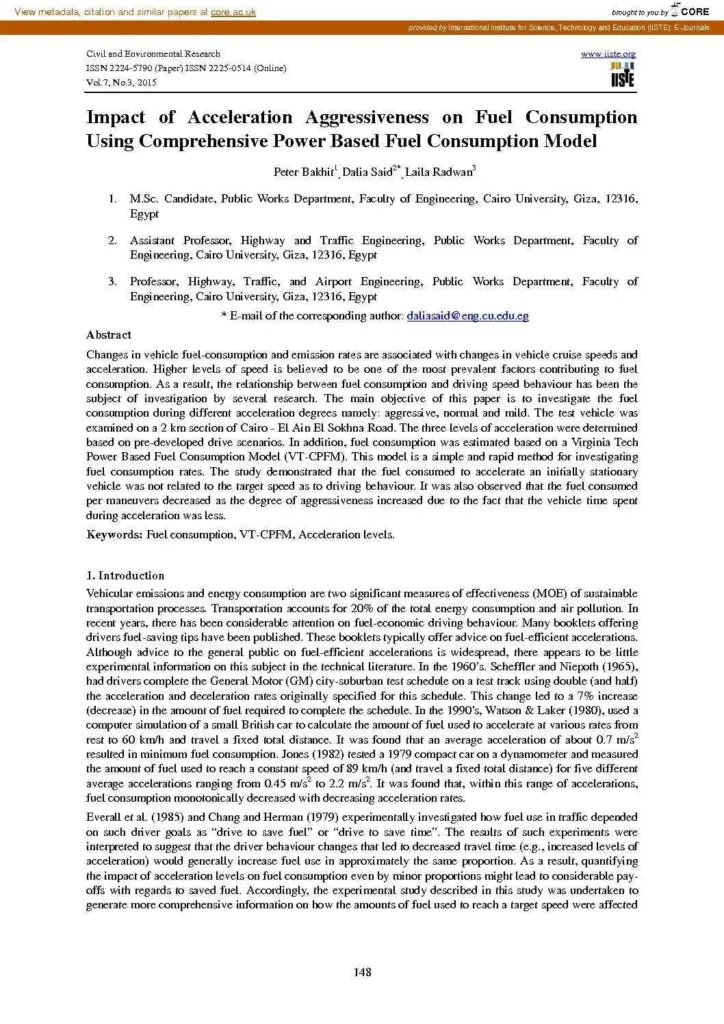Here’s a Counterintuitive Idea About a More Efficient Driving Style
Electric Cars are the rage but the reality is that we’ll be with gas for a while still. The goal of a recent study out of the engineering department at Cairo University in Egypt was to investigate driver and vehicle aggressiveness on fuel consumption. They found that accelerating in a leisurely way to save fuel might actually be using more fuel.
Based on the results it was found that fuel consumption varied directly with the different degrees of accelerations. As the aggressiveness increased, the fuel consumption per maneuver decreased, due to the less time spent in acceleration. Fuel consumed in instances of aggressive acceleration was 8% less than that of mild acceleration while normal acceleration consumed about 3.8% more than mild acceleration.
Acceleration & Gas Consumption
Most people believe that the best way to improve fuel economy is to be gentle on the accelerator and to maintain a slow and steady pace. It is proposed that half of that statement is correct. The part of maintaining a slow and steady pace will indeed save you gas and money. This study has found that there is a sweet spot and acceleration.
Because of the way that modern engines are less efficient in lower gears, you could be better off accelerating faster rather than slowly gathering speed, particularly when going from a 30mph zone to a highway.
What the data is illustrating is that an internal combustion engine has the highest efficiency when it’s under ‘full load’ or full throttle. It seems that taking longer to get up to speed does not use less fuel, because your engine is having to use fuel for a longer period of time than if you get up to speed with traffic in a more brisk manner. Aiming for two-thirds of maximum throttle while getting up through the gears as quickly as you can is recommended.
Most of us already know that you want to cruise in the highest gear with the lowest revs to save the most fuel. But to get to that point first, you should get to that cruising speed sooner. The longer you drive it a “poor MPG zone”, the more gas you’ll use. We should accelerate up to 60 mph in a brisk manner while also using the lowest revs you can. That means fast gear changes (acceleration) through the rev range so you hit that 60 mph cruising speed, and then you back-off the throttle.
The study is out of Egypt. Therefore, having come from an oil-dependent economy, one should be skeptical. I haven’t delved into the math, nor have I verified any peer review of the methodology or data. This is being highlighted because the basic concept of there being a “sweet spot” in acceleration makes sense from a mechanical perspective. But like all things science, intuition often does not translate into the reality of the physics or mechanics.
In 2015, the study investigated fuel consumption when a car (mid-size Kia hatchback with a 1.6 litre engine) was driven in three different modes: aggressive, normal and mild. A previous and separate study by Dutch and Swedish researchers suggested having the throttle at two thirds to flat-out was the sweet spot for fuel consumption when accelerating.
Also recently, two Polish universities, Opole University of Technology and Wrocław University of Science and Technology, drew similar conclusions. That research looked at the acceleration intensity on energy consumption and drive efficiency during a road test for a passenger vehicle (Toyota C-HR with a 1.2 liter engine). When the car was accelerated from 20mph to 75mph, the study found that going easy on the accelerator was not the best way to maximize fuel efficiency.
That study clarified saying it is advantageous, in terms of energy, to accelerate the car intensively at low gear ratios to reach the assumed final speed or distance. This leads to a significant reduction in the energy consumed by the car’s powertrain.
Here is the Research Paper on the Effect of Acceleration on Fuel Consumption
